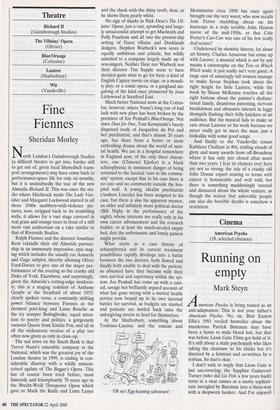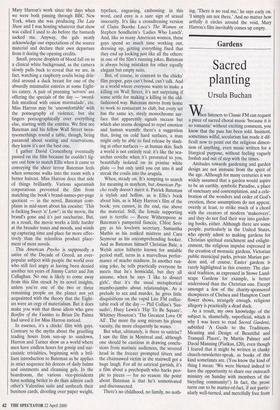Cinema
Running on empty
Mark Steyn
American Psycho is being touted as an anti-adaptation: This is not your father's American Psycho. No, sir. Bret Easton Ellis's 1991 reviled bestseller about the murderous Patrick Bateman may have been a hymn to male blood lust, but that was before Lions Gate Films got hold of it. It's still about a male psychopath who likes taking the chainsaw to his chicks but it's directed by a feminist and co-written by a lesbian. So that's okay.
I don't wish to imply that Lions Gate is just ass-covering: the Sapphist Guinevere Turner (who did Go Fish a few years back) turns in a neat cameo as a snotty sophisti- cate inveigled by Bateman into a three-way with a shopworn hooker. And I've enjoyed Mary Harron's work since the days when we were both passing through BBC New York, when she was producing The Late Show and I was hosting whatever that show was called I used to do before the bastards sacked me. Anyway, the gals neatly acknowledge our expectations of the source material and declare their own departure from it during the opening credits.
Small, precise droplets of blood fall on to a clinical white background, as the camera slowly pulls back to reveal that we are, in fact, watching a raspberry coulis being driz- zled around a duck breast for one of the absurdly minimalist entrées at some Eight- ies eatery. A pair of preening 'servers' are offering the specials of the day — 'sword- fish meatloaf with onion marmalade', etc. Miss Harron may be 'uncomfortable' with the pornography of violence, but she lingers pornographically over everything else, starting with the entrées. We first see Bateman and his fellow Wall Street twen- tysomethings round a table, though, being paranoid about seating and reservations, they know it's not the best one.
I gather David Cronenberg eventually passed on the film because he couldn't fig- ure out how to match Ellis when it came to conveying the sheer terror Bateman feels when someone walks into the room with a better haircut. Miss Harron does that side of things brilliantly. Various squeamish corporations prevented the film from matching the book's brand-names-per-page quotient — in the novel, Bateman com- plains in mid-snort about his cocaine: 'This is fucking Sweet 'n' Low!'; in the movie, the brand's gone and it's just saccharine. But, as a result, the movie works a little harder at the broader tones and moods, and winds up capturing time and place far more effec- tively than the relentless product place- ment of most novels.
This American Psycho is supposedly a satire of the Decade of Greed, an ever- popular subject with people the world over who still feel angry at having been denied another ten years of Jimmy Carter and Jim Callaghan. No one is likely to come away from this film struck by its novel insights, unless you're one of the two or three remaining people on the planet not yet acquainted with the theory that the Eight- ies were an orgy of materialism. But it does make you wish that those idiots who gave Bonfire of the Vanities to Brian De Palma had saved it for Miss Harron instead.
In essence, it's a chicks' film with guys. Contrary to the myths about the gruelling trading hours from sun-up to sundown, Harron and Turner show us a world where men have endless hours for gossip and nar- cissistic trivialities, beginning with a bril- liant introduction to Bateman as he applies in strict sequence his dozens of daily balms and ointments and cleansing gels. In the boardroom, the various vice-presidents have nothing better to do than admire each other's Valentino suits and unsheath their business cards, drooling over paper weight, typeface, engraving, embossing: in this word, card envy is a sure sign of sexual insecurity. It's like a crossdressing version of Claire Boothe Luce's The Women or Stephen Sondheim's 'Ladies Who Lunch'. And, like so many American women, these guys spend so much time working out, dressing up, getting everything fixed that they end up looking just like all the others: in one of the film's running jokes, Bateman is always being mistaken for other equally elegant but empty suits.
But, of course, in contrast to the chicks' film proper, guys can't bond, can't talk. And in a world where everyone wants to make a killing on Wall Street, it's not surprising if some settle for making a killing in the old- fashioned way. Bateman moves from home to work to restaurant to club, but every set has the same icy, steely monochrome sur- face that apparently signals success but which also seems designed to repel emotion and human warmth: there's a suggestion that, living on cold hard surfaces, a man might only be able to find release by slash- ing at other surfaces — at human skin. Such a world is not entirely real: it's like the sea- urchin ceviche when it's presented to you, beautifully isolated on its pristine white plate — but only until you cut into it and streak the coulis into the arugula.
Whoa, steady on. It's tempting to search for meaning in mayhem, but American Psy- cho really doesn't merit it. Patrick Bateman is stylish and hollow, as is Ellis's book about him, as is Mary Harron's film of the book: you cannot, in the end, rise above the material. Still, the female supporting cast is terrific — Reese Witherspoon as Bateman's pampered fiancée, Chloe Sevi- gny as his lovelorn secretary, Samantha Mathis as his zonked mistress and Cara Seymour as his uncomprehending hooker. And as Bateman himself Christian Bale, a Welsh actor hitherto known for amiable period stuff, turns in a marvellous perfor- mance of macho madness. In another run- ning joke, he tells practically everyone he meets that he's homicidal, but they all assume, when he says 'I like to dissect girls', that it's the usual metaphorical mumbo jumbo about relationships. As a prelude to sex and murder, he gives little disquisitions on the vapid Lite FM coffee- table rock of the day — Phil Collins's 'Sus- sudio', Huey Lewis's 'Hip To Be Square', Whitney Houston's 'The Greatest Love Of All'. The more the song mirrors his glossy vacuity, the more eloquently he waxes.
But what, ultimately, is there to satirise? I saw the film in Montreal and, although one should be cautious in drawing conclu- sions from matinee audiences, the severed head in the freezer prompted titters and the chainsawed victim in the stairwell got a huge laugh. For all its satirical garnish, it's a film about a psychopath who hacks peo- ple to pieces — for no reason: the point about Bateman is that he's unmotivated and disconnected.
There's no childhood, no family, no noth- ing. 'There is no real me,' he says early on. `I simply am not there.' And no matter how artfully it circles around the void, Mary Harron's film inevitably comes up empty.



























































 Previous page
Previous page